by Sara Beth Stoltzfus
Being a parent can be tough. Returning to the role of parent as a 65 year old can be exhausting.
Now, I do not know this from personal experience. I am a 28 year old childless woman. I know this from what I have seen and heard from the grandmas and grandpas I have worked with through the Methodist Children’s Home (MCH) Family Outreach Grandparents as Parents Program (GAPP).
The Grandparents as Parents Program offers supportive in-home services to grandparents raising their grandchildren. The program includes case management, information and referrals for community resources, workshops, assistance with legal issues, and support groups.
Through this program, I have had the privilege of walking alongside young grandparents, older grandparents, grandparents with money, and grandparents with almost no income at all. Some grandparents come to our program seeking legal support, some because they are not making it financially, and some come because their grandchildren have been through so much physical and emotional trauma that they are constantly battling the problem behaviors that result. Some grandparents are just looking for someone to talk with, vent with, and cry with…someone to let them know that they are not alone.
All are coming to our doors because they love their grandchildren.
More and more grandparents are raising their grandchildren. In the United States, approximately 5.8 million children are living in grandparent homes. Similarly, almost 2 million children are living in the home of other relatives. (AARP, 2015). The AARP writes that grandparent caregivers and the children they are raising are frequently isolated. “They lack information about the range of support services, resources, programs, benefits, laws and policies available to help them successfully fulfill their caregiving role.” (AARP, 2015).
Grandparents serving as parents face a whole range of issues that the typical parent may not face. The U.S. Census found that grandparents living with a grandchild in 2012 were more likely to face poverty than those who did not live with a grandchild (Williams, 2012). A 2013 article in the Washington Post cited that 20% of grandparents raising grandchildren are living in poverty (Bahrampour, 2013). Grandparents are often not financially prepared for children to enter their home. This means they often have to take on a second, or even third job to pay for their grandchildren’s needs. Sometimes grandparents quit jobs that they once had in order to be able to adequately care for a child with special needs. While there is some financial help available for grandparents in specific situations, there is not enough financial assistance as many of these families need to feed growing children and themselves. Grandparents are also not getting any younger and often have health issues of their own to deal with. These financial and physical health challenges are highly prevalent amongst grandparents raising grandchildren. The need for greater support for these courageous grandparents is significant.
One of the greatest joys of working with the GAPP Program is facilitating a support group for these grandparents. I love watching one grandparent light up with deep understanding as another grandparent shares their story. I feel great satisfaction hearing a grandparent say they no longer feel so alone. Grandparents serving as parents are dealing with a lot of emotions. They shed tears regularly over their adult child’s drug addiction, another child’s domestic violence charges, the death of an adult child and the many other reasons their grandchild is staying with them. They wish for more for their adult children, but they work hard to set boundaries in order to keep their grandkids safe. Every story is different, but none is without complications.
Many grandparents feel very blessed to have a second chance to parent again. They know they’ve learned lessons over the years. They are often more patient the second time around. While the journey is not easy, most grandparents I’ve talked to feel very blessed by the entrance of their grandchildren into their lives.
We need to support our grandparents serving as parents. They are spending their golden years running around with toddlers, staying up into the night with a traumatized 8 year old, and learning to use a computer for the first time in order to relate to their teenage grandchild. All of the grandchildren that come to live with their grandparents have experienced some type of trauma. This is often trauma the grandparents are not prepared to address. Grandparents as parents need not only programs, such as GAPP and support groups, but a community of support. Grandparents as parents are indeed unsung heroes to our communities’ children.
One quote I often share with the grandparents I work with is:
“The more healthy relationships a child has, the more likely he will be to recover from trauma and thrive. Relationships are the agents of change and the most powerful therapy is human love.” –Bruce Perry
This quote also inspires and strengthens me in this work.
If you know a grandparent you would like to refer to our program or would like more information, please call 254-750-1263.
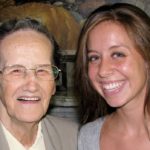 This Act Locally Waco blog post was written by Sara Beth Stoltzfus. Sara Beth is a case manager at the MCH Family Outreach office through the Methodist Children’s Home. Sara Beth received her master’s degree in Social Work from the University of Texas at Austin. Sara Beth is originally from Pennsylvania but has been living in Texas for almost 6 years, 4 of which have been spent in Waco.
This Act Locally Waco blog post was written by Sara Beth Stoltzfus. Sara Beth is a case manager at the MCH Family Outreach office through the Methodist Children’s Home. Sara Beth received her master’s degree in Social Work from the University of Texas at Austin. Sara Beth is originally from Pennsylvania but has been living in Texas for almost 6 years, 4 of which have been spent in Waco.
The Act Locally Waco blog publishes posts with a connection to these aspirations for Waco. If you are interested in writing for the Act Locally Waco Blog, please email ashleyt@actlocallywaco.org for more information.
By Ashley Bean Thornton
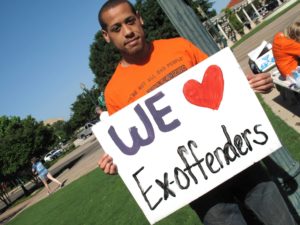 For several years now I have been a part of a conversation in Waco about how to help people returning to our community after incarceration to “reintegrate” into society. (Please visit the McLennan County Reintegration Roundtable website for more information about this on-going work.) One of the key elements for successful reintegration is employment. As you can imagine it is very difficult for an ex-offender to get a job interview much less a job. One idea that is being discussed to help formerly incarcerated individuals get work is “Fair Chance Hiring.” Fair Chance Hiring policies remove the questions about criminal history information from a job application. This change allows employers to judge applicants on their qualifications first, without the stigma of a criminal record. Questions about criminal history are moved later in the process. The idea is that if an employer has had a chance to examine the qualifications of the applicant, and possibly meet the applicant, that employer would be more likely to give the applicant a chance at a job. According to a flyer I received recently from Mission Waco representatives, 13 states have embraced this policy and around 70 cities and counties. On Saturday, April 25, 2015, several organizations in Waco including Mission Waco, Mission World and students from the Tarleton State University Social Work program worked together to hold a rally to advocate for Fair Chance Hiring. I was one of the speakers at the rally. Here are the thoughts I tried to share. Thank you for considering this important idea. – ABT
For several years now I have been a part of a conversation in Waco about how to help people returning to our community after incarceration to “reintegrate” into society. (Please visit the McLennan County Reintegration Roundtable website for more information about this on-going work.) One of the key elements for successful reintegration is employment. As you can imagine it is very difficult for an ex-offender to get a job interview much less a job. One idea that is being discussed to help formerly incarcerated individuals get work is “Fair Chance Hiring.” Fair Chance Hiring policies remove the questions about criminal history information from a job application. This change allows employers to judge applicants on their qualifications first, without the stigma of a criminal record. Questions about criminal history are moved later in the process. The idea is that if an employer has had a chance to examine the qualifications of the applicant, and possibly meet the applicant, that employer would be more likely to give the applicant a chance at a job. According to a flyer I received recently from Mission Waco representatives, 13 states have embraced this policy and around 70 cities and counties. On Saturday, April 25, 2015, several organizations in Waco including Mission Waco, Mission World and students from the Tarleton State University Social Work program worked together to hold a rally to advocate for Fair Chance Hiring. I was one of the speakers at the rally. Here are the thoughts I tried to share. Thank you for considering this important idea. – ABT
My written remarks for the Fair Chance Hiring Rally (They don’t exactly match what I ended up saying, but pretty close!) :
One of the most challenging things about living together in a community is balancing the needs and wants of various groups within the community while also keeping in mind what’s good for the whole community. When we find a tool that can help us do this, we need to consider it seriously. I think this fair chance hiring notion is just such a tool, and I support it. I want to speak for just a moment about how I came to that conclusion. I want to talk for just a little bit about how the practice of asking about criminal history a little later in the hiring process can balance the needs of formerly incarcerated job seekers with the needs of employers who are hiring – and how it can benefit our whole community.
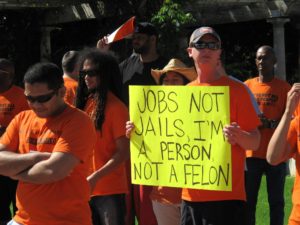 I’ll start with what I believe is good for the whole community. I believe it is good for the whole community for as many of us who can work, to be working. When more of us are working and earning a good income, it benefits the economy of our whole community – more people are buying things and making investments in their homes and more people are paying the taxes that pay for our community amenities. On the other hand, when some people cannot get work because of whatever barrier, whether it be lack of transportation or child care or education, or – as in the example we are grappling with today — a personal history that includes incarceration – it is bad for all of us. It hurts our economy and reduces the pool of resources available to our community. It does not do us any good as a community to have a whole group of people who find it difficult, if not almost impossible, to find work. When more people in our community are working, we are all better off. I believe moving questions about criminal history a little later in the hiring process will result in more people finding work, and I think that will be better for all of us.
I’ll start with what I believe is good for the whole community. I believe it is good for the whole community for as many of us who can work, to be working. When more of us are working and earning a good income, it benefits the economy of our whole community – more people are buying things and making investments in their homes and more people are paying the taxes that pay for our community amenities. On the other hand, when some people cannot get work because of whatever barrier, whether it be lack of transportation or child care or education, or – as in the example we are grappling with today — a personal history that includes incarceration – it is bad for all of us. It hurts our economy and reduces the pool of resources available to our community. It does not do us any good as a community to have a whole group of people who find it difficult, if not almost impossible, to find work. When more people in our community are working, we are all better off. I believe moving questions about criminal history a little later in the hiring process will result in more people finding work, and I think that will be better for all of us.
Next I would like to talk about the group of people who make up this population of formerly incarcerated individuals. Certainly no one doubts it is a benefit to them to be able to find work. We all need money to live. The best way to get money is to have a legal job. If that pathway is closed to you, then what options do you have? You can depend on your family – whose resources more often than not are already stretched to the breaking point. You can start your own business if you have the resources and personality to do that. Or, really, what else can you do? Add this financial reality to the psychological stress of being rejected for work at every turn, and you can see we have an environment that makes it very difficult for a person returning from incarceration to successfully reintegrate into our community. Moving questions about criminal history to a little later in the hiring process at least gives formerly incarcerated people a fighting chance to make their case, to put their best foot forward, to explain why what they CAN do is worth considering. It doesn’t give them a guarantee of a job – none of us have that – but it at least gives them a chance, a foot in the door, to finding a job that will allow them to contribute to our economy.
Finally, I would like to talk about this from the point of view of an employer. I have been an employer. I have had the job of trying to hire the best person for a job as quickly as possible. I know first-hand the expense and aggravation of making a bad hire. And I will admit that as an employer I first thought that getting rid of “the box” – the little check box on the application where a person indicates that they have made some mistakes in their past – was a bad idea.
My resistance was based on a desire for efficiency – when I am in hiring mode I don’t want to waste my time. I want to weed out bad candidates and focus only on good candidates. That little box seemed like an easy way to eliminate unsuitable job seekers. What I have learned is that, like with most things, the easy way is not always the best way.
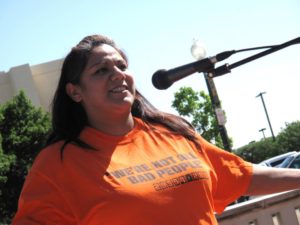 First of all, just because a person doesn’t check the box, that doesn’t mean they are going to be a stellar employee. There are plenty of people out there in the job market who have all kinds of problems that impinge on their ability to be good employees – drinking problems, drug problems, all kinds of problems – just because someone’s problems haven’t resulted in a conviction doesn’t mean they are a perfect angel. Just because a person doesn’t check the box doesn’t mean they have never done anything wrong. The absence or presence of a checkmark in that box doesn’t tell me this person will be a good employee and that person won’t. When it gets right down to it, hiring is somewhat a game of chance. That little checkmark really doesn’t give you as much useful information as it seems like it might at first glance.
First of all, just because a person doesn’t check the box, that doesn’t mean they are going to be a stellar employee. There are plenty of people out there in the job market who have all kinds of problems that impinge on their ability to be good employees – drinking problems, drug problems, all kinds of problems – just because someone’s problems haven’t resulted in a conviction doesn’t mean they are a perfect angel. Just because a person doesn’t check the box doesn’t mean they have never done anything wrong. The absence or presence of a checkmark in that box doesn’t tell me this person will be a good employee and that person won’t. When it gets right down to it, hiring is somewhat a game of chance. That little checkmark really doesn’t give you as much useful information as it seems like it might at first glance.
Second, I have learned through listening to employers who make it a practice to give formerly incarcerated individuals a chance that giving someone a chance can be a good step toward developing a loyal, hard-working, long term employee. Make no mistake – when I am hiring, it is not my goal to be a charity institution. It is my goal to get the best employee for the job. If I can get myself a good, loyal, hardworking, long term employee by giving a motivated person with good skills a chance, why wouldn’t I want to do that? That’s good for me and good for my organization.
I would not support a policy of not being able to ask about criminal back ground at all – certainly as a hirer I would want to know about past behavior. Some crimes will certainly disqualify some people from some jobs. But, if I weed people out because they checked a box before I ever met them, then I am missing out on some potentially good employees. If I talk to someone, find out about their skills, get a sense of their motivation and work ethic, and then find out about the mistakes of their past and what they learned from those mistakes – I can make an informed decision.
I have come to believe that fair chance hiring practices are potentially a benefit to employers as well. Yes, it may take more time in the hiring process – moving the question about past mistakes until later in the process, giving people a chance to make their case, takes more time than throwing away an application that has a check mark in the wrong place. But, finding a great employee is a beautiful thing. If time spent in the hiring process results in a great employee – regardless, or maybe even because of, the mistakes in their past – it saves time in the long run. We have employers in Waco who are reaping this benefit right now because they are willing to give people a chance. I believe it would be a benefit to the employers, to the formerly incarcerated individuals and to our whole community if more would do so.
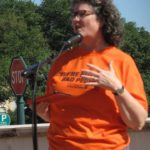 This Act Locally Waco blog post is by Ashley Bean Thornton, the Manager of the www.www.actlocallywaco.org website and the editor of the Friday Update newsletter. The Act Locally Waco blog publishes posts with a connection to these aspirations for Waco. If you are interested in writing for the Act Locally Waco Blog, please email ashleyt@actlocallywaco.org for more information.
This Act Locally Waco blog post is by Ashley Bean Thornton, the Manager of the www.www.actlocallywaco.org website and the editor of the Friday Update newsletter. The Act Locally Waco blog publishes posts with a connection to these aspirations for Waco. If you are interested in writing for the Act Locally Waco Blog, please email ashleyt@actlocallywaco.org for more information.
by Gary Lee Webb, DTM
Do you have trouble getting through a job interview? Are you uncomfortable speaking in front of people you do not know? Would you like to be better at responding to a surprise question? Or better at marshalling your thoughts and presenting your ideas? Perhaps you have a job, but wish to move up to a supervisory position? Or perhaps, you just wish to be a better speaker/presenter at church, work, or other organizations?
If any of these apply to you, Toastmasters International can help. Toastmasters is an international non-profit organization. We are 300,000 people helping people to learn how to communicate better, and we have been doing it for 90 years. Toastmasters offers participants a way to practice communication skills in a supportive environment, a way to meet more experienced speakers and see them in action, and a way to expand one’s horizons across the world. We are a self-paced program, with helpful, individual mentors, usually divided into chapters of roughly 20 people, generally meeting weekly or bi-weekly (see directions below on how to get info on local chapters). There is high level training available for those who want it,
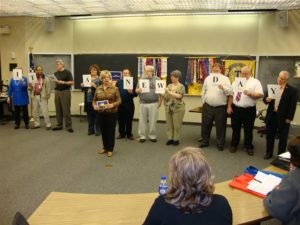 Toastmasters provides a very friendly environment in which beginners can learn, in front of a non-critical audience, that speaking is not hard. Participants go on to learn basic presentation skills, and, as they improve, gain the confidence that they are capable and even excellent speakers. They can either participate in a group (Speechcraft) or learn at their own pace (with a mentor); either way they will get positive criticism, aimed at helping them improve. As they practice, they will periodically see more experienced presenters (at club, contest, or conference), which may help guide their steps to being a better presenter. Eventually, participants discover that it does not matter whether the audience is friendly or not – they know they speak well.
Toastmasters provides a very friendly environment in which beginners can learn, in front of a non-critical audience, that speaking is not hard. Participants go on to learn basic presentation skills, and, as they improve, gain the confidence that they are capable and even excellent speakers. They can either participate in a group (Speechcraft) or learn at their own pace (with a mentor); either way they will get positive criticism, aimed at helping them improve. As they practice, they will periodically see more experienced presenters (at club, contest, or conference), which may help guide their steps to being a better presenter. Eventually, participants discover that it does not matter whether the audience is friendly or not – they know they speak well.
At the same time they are learning public speaking skills, participants are also learning how to handle those surprise questions, learning to marshal their thoughts, and how to respond well. This is a valuable skill particularly in an interview. Interviewers often resort to surprise questions, to see how the applicant responds. A sage response after brief thought could be the key to getting the job.
Toastmasters also develops leadership skills: listening, evaluating, organizing your thoughts, speaking in a way that you are believed, persuasive, or inspirational…in short, getting your message across and convincing people of its wisdom…these skills are a strong foundation for any leader. Participants also learn useful skills like organizing and running a meeting well, or putting together and managing a major project. I know people who used their new skills to get that supervisor position they wanted.
This is our mission statement: “We provide a supportive and positive learning experience in which members are empowered to develop communication and leadership skills, resulting in greater self-confidence and personal growth.” I believe we do it very well indeed: I have seen people become great speakers, authors, and leaders. It is a deep and wide program, with many options for learning and participation.
Members who wish to hold the highest honors demonstrate what they have learned by teaching others. As participants grow in the program they have opportunities to teach new speakers in Speechcraft, teach teenagers in Youth Leadership, teach management skills, and to teach leaders or trainers, as well as many other options. Not all of these are required, but I have done several to my benefit. I can proudly say I am a Distinguished ToastMaster (DTM), signifying I have delved deeply into the program, learning both communication and leadership.
What makes Toastmasters especially valuable is not just the practice, but the immediate feedback and the good role models. The manuals not only train the speaker, they guide the evaluator in what to look for, so that he may better tell the speaker how to improve. And after 90 years of improvement, the manuals are very good.
Moreover, the member will see better speakers to emulate. If the ones in his or her chapter are not good enough, there are other chapters to visit. Twice per year, there is a series of contests, in which members can compete against members from other chapters. The contest winners compete across larger regions, and then across the state. The international contest climaxes with the winner from each of the almost 100 districts world-wide competing in semi- and world finals. Last year (2014), I saw D.J. Swinyar win in the District 25 contest and get flown to Malaysia for the 2014 finals. Contests are optional, only about 10% of members compete, but those who are interested can learn, just by watching. There are also many other optional training opportunities.
In short, Toastmasters is a unique opportunity to improve oneself: as a speaker, as a leader, and in many other ways. The skills are valuable, and so are the friendships. We generally do our best to help each other out, and we tend to be willing to meet and network across the globe. I have become acquainted with astronauts, top businessmen, world champions, and great authors; I personally know toastmasters in three continents. The basic cost is $72 per year (prorated for a partial year); individual chapters may add local dues (there are seven chapters in the Waco area). And there is a $20 initial fee for a new member (pays for the initial manuals). That is incredibly cheap compared to other options for this kind of development. Toastmasters is a very cost-effective way to learn.
I hope you will consider coming and visiting one of our chapters – guests are always welcome. If you like what you see, if you think it will help you grow into a more capable person, I hope you will consider joining. For details of when and where we meet, you can e-mail me at GaryLeeWebb@D25Toastmasters.org or check out the international web site, www.toastmasters.org, and put in your zip code after clicking “Find a Club” on the top bar.
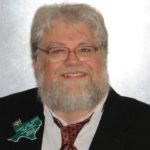 Gary Lee Webb is a 17-year resident of Waco. He recently completed a successful year as a president’s distinguished Division Governor for Toastmasters International, guiding 29 central Texas chapters. His credits include film chairman for the 1982 West Coast Science Fiction Convention, over 360 public speeches, assisting at both high school and adult speech contests, and over 40 publications (14 fiction). He is 59, married 38 years, with 4 daughters.
Gary Lee Webb is a 17-year resident of Waco. He recently completed a successful year as a president’s distinguished Division Governor for Toastmasters International, guiding 29 central Texas chapters. His credits include film chairman for the 1982 West Coast Science Fiction Convention, over 360 public speeches, assisting at both high school and adult speech contests, and over 40 publications (14 fiction). He is 59, married 38 years, with 4 daughters.
The Act Locally Waco blog publishes posts with a connection to these aspirations for Waco. If you are interested in writing for the Act Locally Waco Blog, please email ashleyt@actlocallywaco.org for more information.
By Alicia
What comes to your mind when I say Autistic? Who do you picture in your head? Perhaps a child in your neighborhood who flaps their hands with happiness? Or an adolescent who gives you a detailed account of the solar system’s activities? Maybe the adult from church, who rocks back-and-forth during most services?
Perhaps you have heard that autism is a spectrum. But what does that mean? Autism is a developmental disability and another way of being in the world. To describe behavioral traits common to autistic people, we begin with the medical model, the DSM-5 entry for autism spectrum disorder (APA, 2013, pp. 50-51).
– Social communication impairments
– Restricted and/or repetitive behavioral patterns
**********************************
But this entry isn’t complete. It describes what autism looks like, but fails to describe the everyday lives of Autistic individuals. I lapse into academic language when I try to write about autism from a perspective other than my own. I attempt to describe autism in behavioral terms, rather than lived experiences, and get lost in this phrasing.
It is no easier to write about autism from a clinical perspective. For me, the personal is academic. I began reading about autism because I wanted to better understand my friend from undergraduate studies, a young woman with Asperger syndrome.
***************************************
“Many of us will become interested in psychology and the helping professions along the way, either because of our diagnosis or in search of it. We find we want to nurture and help others in their journeys because we know how hard it can be.” ~ Rudy Simone, Aspergirls
Perhaps I am in-between these spaces — the personal and the academic. Not entirely ready to come out, for fear I might be wrong about myself. For the past two years, I’ve read autism blogs and books, immersed myself in the online Autistic community, and befriended women like me. We are writing a narrative of what #AcceptanceMeans.
*****************************************************
Becoming (not finding) yourself is neither a linear, nor coherent process. In the spring of 2013, I first acknowledged my Autistic traits. I remember reading Rudy Simone’s book, Aspergirls. I took copious notes, surprised how the experiences she described resonated with my own.
With the support of the women in my writing circle and like-minded women online, I continued to explore this narrative through research and poetry. April is Autism Acceptance Month. Perhaps acceptance begins with myself.
*****************************************************************
How long will I have to mince my words? You see, I have these traits – I’m 85 to 95% sure that this is who I am. I’ve lived in euphemistic dialogue for some time now…
I’m socially different, sensory sensitive; missing gist for detail. This is who I am, regardless of how you choose to see me, label me. We sustain ourselves in these Voldemorty spaces – that which shall not be named.
I’m autistic. Not that you’ll believe me. We’re unicorns. The highly verbal, completely awkward, often confused. I’m not a 12-year-old boy who likes trains. Does that surprise you? It shouldn’t.
My passions are information gathering, sorting, and sensemaking. That’s why I’m here today. I brought a list of all the things you might think are wrong with me – I prefer different. This is merely a collection of traits – some of which get me stuck. Please don’t medicalize me, marginalize me.
This is new to you. Not to me – I’ve been this way my entire life – just hadn’t found my coherent narrative. Hadn’t imagined there were others like us, rising in dust and hashtagging it – dialoguing across countries and timezones. Other women like me, yet utterly alien in their own spaces.
We are developing our own dialogue, a shared narrative – together. I see us in a decent-sized room, sitting at a table, offering virtual cups of tea.
Remembering.
Verbalizing.
Being.
In this created space – creative space. We are ourselves, with little explanation. Needing no one else to fill in our gaps. We are our own. Here anyway. Coda. Yet this space, although not enough, is a starting point. Free from labels or to label as we wish. Existing together in a shared collage of narratives.
Of course this text-based medium would serve us well. Free from constraints of nonverbals and missed cues.
We are here in this place. We fit. We belong. And we are enough. Together.
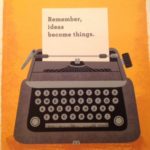 Alicia is a graduate student at Baylor University. She writes for reasons both pragmatic and personal. She became involved in the Waco arts community through In the Words of Womyn – Heart of Texas.
Alicia is a graduate student at Baylor University. She writes for reasons both pragmatic and personal. She became involved in the Waco arts community through In the Words of Womyn – Heart of Texas.
For more information about Autistic women, visit Autism Women’s Network (http://autismwomensnetwork.org).
For general autism resources, visit Autism Society (http://www.autism-society.org) and Autistic Self Advocacy Network (http://autisticadvocacy.org)
Local programs for individuals on the autism spectrum include:
- Heart of Texas Autism Network (http://www.hotautismnetwork.org)
- ARC of McLennan County (http://www.wacoarc.org)
- Baylor Center for Developmental Disabilities (http://www.baylor.edu/bcdd/)
The Act Locally Waco blog publishes posts with a connection to these aspirations for Waco. If you are interested in writing for the Act Locally Waco Blog, please email ashleyt@actlocallywaco.org for more information.
References:
American Psychiatric Association. (2013). Diagnostic and statistical manual of mental disorders (5th ed.). Washington, DC: Author
by Dawn Wible
- A friend blankly stares across the table while you check your texts. As she anxiously awaits an answer, you have no idea what she just said.
- Your four year old is describing his new friend at school, but you are busy scrolling through the newsfeed and missing the whole story.
- Vegging on the couch was the agenda for the night but instead you are responding to a work email at 11:15pm, because really, what are “work hours” these days anyway?
We have all found ourselves in these situations, myself included. It truly is a sign of the times.
The two questions I ask myself are: “Why am I choosing to put my relationships on the back burner?” and “When and where is the best time to be on my device?” I believe we do not even realize we are making these small and influential choices. Statistics and studies are actually showing a change in our brain function due to technology addiction. Many neurologists and psychologists are pointing to our dependence on technology as the root of many mental, physical, emotional, spiritual, social and relational issues. These issues range from poor academic or job performance, to job loss, lack of social connectedness, sleep disorders, divorce and in some cases even death.
There’s a crucial conversation happening in our culture concerning the problem of tech addiction, and my family and I want to be a part of the solution! This idea has become so important to the mental health of my family that we started a local movement: Talk more. Tech less.
Talk More Tech Less is for myself, and essentially anyone who uses technology in this tech heavy culture. This is not an anti-technology movement; it is a pro-relationship movement. I’m a mom of three BOYS and technology is very much a part of my family’s life. But, we struggle with the overuse and addiction that causes tantrums, irritability, ignoring, zoning out…you get the picture. Like most of you, my phone is my home and work computer in hand. It helps me to be efficient – way more efficient than I would be without my device. It is valuable, but it also distracts me from the life going on right in front of me. I realized a few years back that I needed to shift my perspective and priorities. I saw it not only in my own life, but in society as well. We can get lots of information, facts and communication from our phones, but what we’re missing is the emotion, the conversation, and the connection that should come with communication.
Talk More Tech Less was birthed from mentoring and spending time with teenagers. My husband, Matt, runs a Waco based organization called Field Guides that mentors young men through outdoor activities. We have seen first- hand the benefits of getting young men away from all the distraction and overuse of technology, video games, smart-phones and computers and getting them outside! As the CRC Health Group says, “There is a strong body of research confirming that direct contact with nature increases mental health and psychological and spiritual development. Benefits include stress reduction, a sense of coherence and belonging, improved self-confidence and self-discipline, and a broader sense of community.”
At Field Guides summer camps we have participants take one-week breaks from their phones. Working with these guys year after year our eyes have been opened to some true dependency issues involving technology. We have also been privileged to see the breakthroughs that happened as they embraced this process. With those experiences as background I began researching tech dependency and addiction stats and saw the great need in this culture for balance and freedom.
Last summer we had the campers construct boxes for their phones. We encouraged them to take the boxes home and use them with their families. The idea is that family members place their phones in these “Detox Boxes” during meal times and other important moments during the day and night.
Our own family’s experience with technology balance, my research into this subject, and the success of this “detox box” idea convinced me that other people could benefit from a structured way to explore and reduce dependency on technology. That led me to create the Talk More Tech Less 30 Day Experience. The 30 day experience is designed to strengthen relationships and create awareness about the overuse of technology. It is a guide to empower individuals, families, and groups to find balance, leading to greater connection. I hope it will help those who use it gain control of this growing concern in our culture and world.
The 30 Day Experience includes a custom made “Detox Box”, 30 daily note cards, a journal and a decal. The box is created to place our devices in during strategic times throughout the day. They are locally crafted here in the 254, by Sticker Universe and Hole in the Roof Marketing. The daily note cards are a true journey to healthy technology usage. Each card takes approximately 90 seconds per day, so as not to take up time, but to give it back. Those involved are actually surprised at how much time they have on their hands during the 30 days.
Research shows negative effects from the lack of face-to-face, eye contact, physical, spiritual and emotional contact. In the 30 Day Experience we pool all that information and combine it with practical ways to deal with and replace this dependency issue. Talk More Tech Less is designed to bring conversation and connection back to our culture. We’d love you to be a part of this movement! For more information please visit us at www.talkmoretechless.com
 Dawn Wible is the creator of Talk More. Tech Less. She is a Waco resident and graduate of Baylor University. Her husband, Matt founded and runs an outdoor ministry, Heart of Texas Field Guides, that mentors young men through outdoor activity. Together they raise 3 amazing boys, Levi, Jude and Ty. Dawn finds life in deep connection with family and friends, volunteering, kayaking, cooking, jogging and she loves a good party.
Dawn Wible is the creator of Talk More. Tech Less. She is a Waco resident and graduate of Baylor University. Her husband, Matt founded and runs an outdoor ministry, Heart of Texas Field Guides, that mentors young men through outdoor activity. Together they raise 3 amazing boys, Levi, Jude and Ty. Dawn finds life in deep connection with family and friends, volunteering, kayaking, cooking, jogging and she loves a good party.
The Act Locally Waco blog publishes posts with a connection to these aspirations for Waco. If you are interested in writing for the Act Locally Waco Blog, please email ashleyt@actlocallywaco.org for more information.
By Cecelia Rodriguez
Do you have an older friend, or perhaps a friend with a disability, who is on a limited income? Booth Garden Apartments might be the perfect home for him or her. We are proud of the environment we have created here at Booth Gardens, and we would like to make sure that those who might need a place like Booth know that it is here for them.
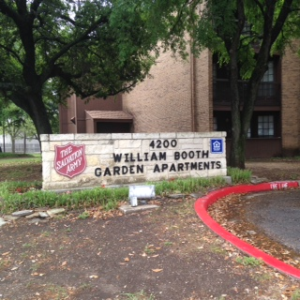 The Booth Garden Apartments are an independent housing community owned and managed by the Salvation Army. We provide safe and comfortable living conditions at affordable costs for seniors, and those with federally defined disabilities, who have limited incomes. At Booth Garden Apartments, residents can live in an atmosphere of love, acceptance and encouragement.
The Booth Garden Apartments are an independent housing community owned and managed by the Salvation Army. We provide safe and comfortable living conditions at affordable costs for seniors, and those with federally defined disabilities, who have limited incomes. At Booth Garden Apartments, residents can live in an atmosphere of love, acceptance and encouragement.
The Booth Gardens Apartments are one-connected building, but they are actually two separate projects: William Booth (which faces N. 19th) and Catherine Booth Garden Apartments (which faces Stewart Dr.). William Booth was first opened for occupancy in 1983 and Catherine Booth was later opened for occupancy in 1997.
 The buildings are four stories high, and together contain 196 one bedroom apartments. The apartments include added amenities especially designed to benefit our two target audiences: persons 62 years of age or older, and persons 18 or older who have a federally defined disability. William Booth is for those who are 62 years of age or older and also for those that are at least 18 years of age with a federally defined disability. Catherine Booth is just for senior citizens, 62 years of age or older.
The buildings are four stories high, and together contain 196 one bedroom apartments. The apartments include added amenities especially designed to benefit our two target audiences: persons 62 years of age or older, and persons 18 or older who have a federally defined disability. William Booth is for those who are 62 years of age or older and also for those that are at least 18 years of age with a federally defined disability. Catherine Booth is just for senior citizens, 62 years of age or older.
We contract with HUD (U.S. Department of Housing and Urban Development) which provides subsidized rent for our residents. The apartments are reserved to be safe, comfortable homes for people with limited income. Annual income limitations (which are subject to change annually) are currently $19,150.00 per year for a single person and $21,900.00 per year for couples. The exact rent charged is based on a formula which takes into account the residents’ adjusted gross income, assets and medical expenses.
Here are some of the things residents appreciate about living at Booth Gardens:
- A group of our residents have formed a very active “Tenant Council” which meets monthly. They lead numerous activities ranging from trips to lunch fundraisers and are continuously working to be a voice for our residents.
- We offer a variety of activities including weekly bus trips to H-E-B and Walmart.
- There is a 24 hour response system in case of emergencies. Emergency pull-cords are available near the beds and in the bathrooms of each apartment and can be put to use in case of a medical emergency.
- Multi-faith groups come-in to conduct spiritual programs. We also enjoy a variety of educational programs hosted by local home healthcare agencies.
- We have a resident chaplain, Major Harvey Harwell. He leads regular Bible studies and devotion times and offers counseling to those who need it.
- Our resident services coordinator, Mrs. Barbara Parnell, is also available to help residents meet their own needs.
- Domesticated pets are welcome.
- We have a total of 3 laundry facilities.
- Although we are independent living, many of our residents have private contracts with home-health care agencies that enable them to remain independent.
- We have a partnership with “Meals and Wheels” program which provides lunch meals to our residents three days a week.
- Friends for Life is a partner and has helped some of our residents meet financial management and budgeting needs. This also helps them to stay independent longer.
It has been an honor and a pleasure to serve with The Salvation Army Booth Garden Apartments for the past 10 years. I cherish every moment participating in and assisting with housing for senior citizens. Several years ago I lost my mother, who was disabled, and shortly after, an elderly aunt. They are my inspiration for being part of this wonderful ministry. Like many others, they were on limited means of income, and faced health challenges. They struggled to maintain the aging, deteriorating home in which they lived. We hope that our residents are able to be as independent as possible, for as long as possible and receive the dignity and respect they deserve in a safe and affordable home. If you know someone who is looking for a home who you think might be a good fit for the Booth Gardens, please contact us! You may contact me, Cecilia Rodriquez by email at Cecilia_Rodriquez@uss.salvationarmy.org, or our Assistant Director, Rachel Sheridan at Rachel_Sheridan@uss.salvationarmy.org, or call either of us at (254) 757-2242. We look forward to hearing from you!
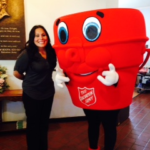 This Act Locally Waco blog post is by Cecilia Rodriquez. Cecilia began her ministry with The Salvation Army Booth Gardens Apartments as the receptionist 10 years ago and is now the Director of both properties. She is a Certified Manager of Housing and Certified Occupancy Specialist through the National Center for Housing Management. She has a passion for senior citizens and also enjoys being an active part in her children’s lives coaching in her spare time. She is family-driven and thrives on helping to make a difference in people’s lives as she carries out the mission of The Salvation Army.
This Act Locally Waco blog post is by Cecilia Rodriquez. Cecilia began her ministry with The Salvation Army Booth Gardens Apartments as the receptionist 10 years ago and is now the Director of both properties. She is a Certified Manager of Housing and Certified Occupancy Specialist through the National Center for Housing Management. She has a passion for senior citizens and also enjoys being an active part in her children’s lives coaching in her spare time. She is family-driven and thrives on helping to make a difference in people’s lives as she carries out the mission of The Salvation Army.
The Act Locally Waco blog publishes posts with a connection to these aspirations for Waco. If you are interested in writing for the Act Locally Waco Blog, please email ashleyt@actlocallywaco.org for more information.
By David Saucedo
The Reinforced Earth Company is a precast concrete company that is part of a national and international conglomerate comprised of construction, technology and concession companies, among others. We are located in China Springs and we employ between 150 to 160 people, many of which are Waco residents.
My personal passion for community change and empowerment has played out in many ways over the last four to five years, but the last two years have been amazing! When I was hired at Reinforced Earth in 2013, I never thought the most enlightening and fulfilling work so far would take place at this company, but it has. I was blessed with opportunities, and I advanced to become the Safety Coordinator in late 2013. This promotion opened doors that I would have never imagined and allowed me to work with some terrific people who have taught me a great deal about what we call “foundational employment” – employment that is foundational to a stable lifestyle.
The Reinforced Earth Company’s Waco plant, managed by James Ashley, is paving a new road in employee development. We focus on a quality made product, produced in a timely manner, as safely as possible. But most importantly we are aiming to promote healthy and stable lifestyles to the men in our community that work here. From a business perspective, it goes without saying that a high turnover rate interferes with those goals and makes it very hard to establish maximum efficiency. In 2014 our company on average employed 58 workers per month through local staffing agencies. This not only increased the cost of producing our product, but it also led to a workforce with less experience and more potential for mistakes or injuries.
We began our work in foundational employment by using encouraging messages in our safety toolbox meetings. For example, we would use words like, “This is a family out here,” or “We want you to use Reinforced Earth as a foundation for your family.” We encouraged car pools to help employees who didn’t have transportation, showing that we are here to help. We introduced simple budget spreadsheets and encouraged employees to ask how they could escape the check-to-check lifestyle. Our most recent, and I think our most fruitful step has been referring and encouraging our employees to a local psychiatrist that is covered by our insurance. In some cases we even covered the copay for employees who are more serious about improving their standard of living.
I’m very proud to report that this month we will be reporting that fewer than 20 employees are working at Reinforced Earth through local staffing agencies. We have increased production and decreased our production hours by improving our production procedures and focusing on better training and efficiencies. By no means would our efforts be considered a comprehensive study, but we are seeing results and we associate these results with the investments we are making in our employees.
From these experiences, I’m very confident that a company dedicated to promoting strong foundations in the lives of their employees will see improvements in the quality of their workforce, a decrease in their turn over, a reduction in overhead, and — the icing on the cake — an increase in their profits. What would our community look like if more companies were encouraged to promote strong and healthy foundations in the lives of their employees? That’s a question I have been asking myself more and more.
 This Act Locally Waco blog post was written by David Saucedo. David is a local minister with Life Church Waco and has committed the last 8 years of his life to impacting his community in a positive way. David has a loving wife, Michelle and three beautiful children, Lianna (7), Isaiah (4) and Isaac (10 Months).
This Act Locally Waco blog post was written by David Saucedo. David is a local minister with Life Church Waco and has committed the last 8 years of his life to impacting his community in a positive way. David has a loving wife, Michelle and three beautiful children, Lianna (7), Isaiah (4) and Isaac (10 Months).
The Act Locally Waco blog publishes posts with a connection to these aspirations for Waco. If you are interested in writing for the Act Locally Waco Blog, please email ashleyt@actlocallywaco.org for more information.
By Donna McKethan
In the Fall of 2015, the Greater Waco Advanced Health Care Academy (GWAHCA) will open its doors to Waco area juniors and seniors who are interested in pursuing a career in the health care industry. The Greater Waco Advanced Health Care Academy is a unique and innovative collaboration between the local health care community and Waco Area School Districts. GWAHCA will create a challenging learning environment that encourages high expectations for student success in the Health Care Field. The academy will empower students to successfully be competitive and workforce ready in our community and a global society.
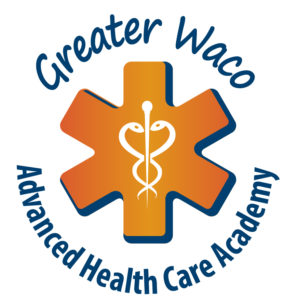 GWAHCA follows a model similar to the Greater Waco Advanced Manufacturing Academy, which aims to give students a head start in careers in welding and manufacturing. Officials from area school districts, McLennan Community College, Texas State Technical College and area health care industry leaders have been meeting over the last two years to determine health care industry needs and how to best serve students. The twin philosophies of realism and experimentalism are embedded in the attitudes and beliefs behind the planning and remodeling of GWAHCA. These philosophies have been expressed by the members of the GWAHCA Executive and Steering Committees. The idea behind not only the curriculum but also the facility is to give students an experience that aligns with what they will encounter when they graduate and begin a career in the health care industry. Partners support GWAHCA, an academy that fosters a sense of community among students, staff, parents, partners and neighbors. GWAHCA students will develop a sense of self-esteem and respect for themselves and others. Through a diverse and challenging curriculum, focusing on basic science, GWAHCA will cultivate student interest in various sciences and health professions. GWAHCA will provide a quality education and experiences that will prepare students to develop the academic, social and personal qualities necessary to realize their fullest potential as lifelong learners and productive, caring citizens of the world.
GWAHCA follows a model similar to the Greater Waco Advanced Manufacturing Academy, which aims to give students a head start in careers in welding and manufacturing. Officials from area school districts, McLennan Community College, Texas State Technical College and area health care industry leaders have been meeting over the last two years to determine health care industry needs and how to best serve students. The twin philosophies of realism and experimentalism are embedded in the attitudes and beliefs behind the planning and remodeling of GWAHCA. These philosophies have been expressed by the members of the GWAHCA Executive and Steering Committees. The idea behind not only the curriculum but also the facility is to give students an experience that aligns with what they will encounter when they graduate and begin a career in the health care industry. Partners support GWAHCA, an academy that fosters a sense of community among students, staff, parents, partners and neighbors. GWAHCA students will develop a sense of self-esteem and respect for themselves and others. Through a diverse and challenging curriculum, focusing on basic science, GWAHCA will cultivate student interest in various sciences and health professions. GWAHCA will provide a quality education and experiences that will prepare students to develop the academic, social and personal qualities necessary to realize their fullest potential as lifelong learners and productive, caring citizens of the world.
The first programs to be offered at GWAHCA will be the Certified Nursing Assistant (CNA) and Advanced CNA programs. The CNA curriculum will follow the current program offered at McLennan Community college. The Advanced CNA course is being developed in collaboration with Providence and Baylor Scott and White (Hillcrest) Hospital Staff. This curriculum development is an exciting process and will result in an amazing and rigorous program. In addition to the CNA course, juniors will also take Anatomy & Physiology, Counseling and Mental Health and Medical Terminology. Seniors (who have completed the CNA certification) will take Phlebotomy and a soft skills course that will include training in the hospitals computer system. Both hospitals have promised to hire all students who successfully complete the Advanced CNA program.
GWAHCA will be located on the campus of the former Viking Hills Elementary school. The campus is located on Viking Drive just off Fish Pond Road. All Juniors and Seniors within 45 minutes of the academy are eligible to attend. Applications are currently being accepted. For more information, contact Donna McKethan (254 755 9573 or donna.mckethan@wacoisd.org)
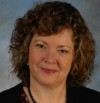 This Act Locally Waco blog post was written by Donna McKethan. Donna is the Career and Technology Director at Waco ISD. She has 33 years in education, the last 15 with WISD Career and Technology. She is currently the President of The Career and Technology Association of Texas. She is a WISD graduate with a BS in Home Economics Education from Baylor University and an MS of Education from Tarleton State University. She is currently enrolled in the Doctorial Program in Educational Leadership at Tarleton State University.
This Act Locally Waco blog post was written by Donna McKethan. Donna is the Career and Technology Director at Waco ISD. She has 33 years in education, the last 15 with WISD Career and Technology. She is currently the President of The Career and Technology Association of Texas. She is a WISD graduate with a BS in Home Economics Education from Baylor University and an MS of Education from Tarleton State University. She is currently enrolled in the Doctorial Program in Educational Leadership at Tarleton State University.
The Act Locally Waco blog publishes posts with a connection to these aspirations for Waco. If you are interested in writing for the Act Locally Waco Blog, please email ashleyt@actlocallywaco.org for more information.
By James Karney
Let’s go!
Batter up!
We’re tak-ing the af-ter-noon off!
It’s a beau-ti-ful day for a ball game, for a ball game to-day
The fans are out to get a ticket or two
From Wal-la, Wash-ing-ton to Kal-a-ma-zoo
– It’s A Beautiful Day For A Ball Game by Harry Simone
Spring is here and baseball opening day pitches are being thrown out from the Big Leagues to Little League.
In the Waco area hundreds of youth participate in Little League Baseball and Softball learning playing skills, teamwork, sportsmanship and character. I’d like to share with you about a division of Little League you probably did not know existed.
Challenger Little League provides the opportunity for children with physical, intellectual and developmental disabilities to play Little League baseball. During the April and May season, 125 area children play on a specially outfitted field with solid surface base paths at the Lake Air Fields with dedicated coaches and buddies guiding them. No matter the ability or skill level, “everyone plays!”
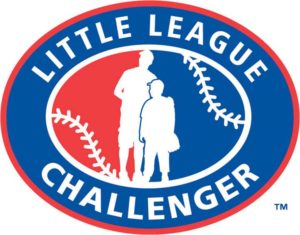 This year Challenger Little League in Waco celebrates its 25th season with children and teens from age 5 to 18 playing on ten teams. Challenger baseball came to Waco in 1990 as one of the first locations in Texas with 34 children participating that year.
This year Challenger Little League in Waco celebrates its 25th season with children and teens from age 5 to 18 playing on ten teams. Challenger baseball came to Waco in 1990 as one of the first locations in Texas with 34 children participating that year.
The kids have a great time just being kids playing ball and for parents it’s a little bit of normalcy just sitting in the bleachers with other parents watching their children play Little League baseball like any other parent.
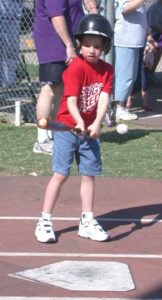 My son Jamie has played in Challenger since 2004 and I’ve been a coach since 2009. It’s been a great experience for both of us. When Jamie first played he’d hit the ball, run down to first base and then keep running straight down the right field line all the way to the outfield fence. Over the years his skill level has increased and he now hits a pretty mean line drive. I look forward to April and May, getting out my glove from high school and playing with the kids.
My son Jamie has played in Challenger since 2004 and I’ve been a coach since 2009. It’s been a great experience for both of us. When Jamie first played he’d hit the ball, run down to first base and then keep running straight down the right field line all the way to the outfield fence. Over the years his skill level has increased and he now hits a pretty mean line drive. I look forward to April and May, getting out my glove from high school and playing with the kids.
Challenger would not be possible without dedicated volunteers who manage league operations, coach, serve as buddies or team and league sponsors. Lupe Rosas, Don Deatherage and Michelle McCollum have worked with Waco’s Challenger League from its beginnings in 1990. Others like Coleen Ostrom and Pepper Jones make things run smoothly every year arranging for uniforms, volunteer buddies, fundraisers and more. Each of the ten Challenger teams has two or three coaches. Many of the coaches, like in other Little League divisions, are parents who want to share their love of baseball and sports with their son or daughter.
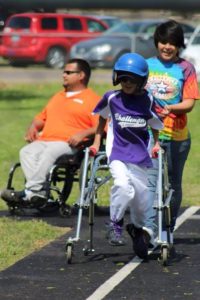 At every game you will also find buddies for the players. Buddies play a vital role in the game by being paired up with a player to provide them assistance they might need from pushing a wheel chair, putting on a batting helmet, keeping them focused on the game (and not watching airplanes flying overhead.) and most importantly encouragement.
At every game you will also find buddies for the players. Buddies play a vital role in the game by being paired up with a player to provide them assistance they might need from pushing a wheel chair, putting on a batting helmet, keeping them focused on the game (and not watching airplanes flying overhead.) and most importantly encouragement.
Some buddies volunteer for the season while others come out for a game or two. These buddies are frequently from other Little League teams or high school baseball and softball teams. Last season members of the Baylor Lady Bear’s Softball team were buddies at one of our games. The buddies also allow parents a period of respite to sit in the stands, visit with other parents and cheer on their little sluggers.
Team sponsors are another part that makes Challenger Little League possible by providing funding to help underwrite costs. For the 2015 season team sponsors are:
 The Don Deatherage Challenger Field is located near the City of Waco’s Cobbs Recycling Center by Lake Air Fields 4 & 5. Games are played Tuesday and Thursday evenings at 6pm and 7pm and on Saturday morning’s beginning at 9am. Opening day games are this Saturday, April 18. (Facebook: Challenger Little League in Waco.)
The Don Deatherage Challenger Field is located near the City of Waco’s Cobbs Recycling Center by Lake Air Fields 4 & 5. Games are played Tuesday and Thursday evenings at 6pm and 7pm and on Saturday morning’s beginning at 9am. Opening day games are this Saturday, April 18. (Facebook: Challenger Little League in Waco.)
Come on out some evening or Saturday morning and cheer on these great athletes!
 This Act Locally Waco blog post is by James Karney. James worked in a library beginning in his sophomore year of high school and after a more than thirty year library career recently retired as Director of the Waco-McLennan County Library. He’s currently taking a sabbatical working on projects around the house, catching up on reading and doing research on Texas statesman Coke Stevenson. He has been married to the super amazing and talented Anita Karney for 20 years and their son Jamie is a junior at Midway High School.
This Act Locally Waco blog post is by James Karney. James worked in a library beginning in his sophomore year of high school and after a more than thirty year library career recently retired as Director of the Waco-McLennan County Library. He’s currently taking a sabbatical working on projects around the house, catching up on reading and doing research on Texas statesman Coke Stevenson. He has been married to the super amazing and talented Anita Karney for 20 years and their son Jamie is a junior at Midway High School.
If you would like to write a post for the Act Locally Waco blog, please contact Ashley Thornton by email at ashleyt@actlocallywaco.org .
By Alfred Solano
What do new bike lanes, the Hippodrome reopening, Franklin Place, Dichotomy, Lula Jane’s, Muddle, Tinsley Place, Barnett’s Pub, and McLane Stadium all have in common? They’re all recent developments that have collectively changed the landscape of Downtown Waco during the past few years.
In 2010, we, as a community, began to dream and imagine what we want our city to look and feel like. The Imagine Waco plan was developed and adopted. Five years later, we look around and see a new, livelier downtown—one which we proudly call home. However, there is still much to accomplish. As we plan for the next five years of growth and development, we need to update the Imagine Waco plan and include everyone’s voice.
When the Imagine Waco plan was adopted in 2010, goals included activating the riverfront, building connections for people to get around, and creating an organization that implements development in Downtown Waco. More than two-thirds of Imagine Waco’s proposed action items are in the realization process. Over the past five years, public space investments have included improvements to sidewalks and crosswalks, added bike lanes, and new trees that have been added along streets to upgrade the walkways. Future shared spaces will include the transformation of the Heritage Square parking lot and the riverfront. Some of the private sector developments (leveraged by public investments) include Franklin Place, Tinsley Place, the Hippodrome, and Lula Jane’s. A small area planned for the “Near Northside” area around 15th and Colcord resulted in increased public and private investments, including streetscape improvements that beautified the intersection.
Organizational developments included the creation of the Downtown Development Corporation, 1,000 Friends of Waco, and efforts by the Sanger Heights and North East Riverside Neighborhood associations to improve their areas and business districts, according to the Imagine Waco plan.
Behind the scenes, the City of Waco has embedded principles from Imagine Waco into planning and engineering decisions. This paradigm shift has changed the design and the feel of projects and Downtown Waco altogether.
As we look at the first years of Downtown Waco’s renaissance and the series of projects that have been accomplished by private investors and the City during the last five years, we look ahead with excitement and anticipation about what is next for our city.
Five years ago, the Waco community dreamed together…and now it’s time to dream again!
What makes The Imagine Waco plan achievable and exciting is that it is designed by the people who live and work in the Waco area for the benefit of the entire Waco community. We want your dreams and aspirations to be a part of the Imagine Waco update. Next week, there will be severral opportunities for your voice to be heard. Everyone is invited and encouraged to give their input about the future of Downtown Waco.
- Monday, April 13th, The Jubilee Theater @ 6PM
(1315 North 15th Street, Waco, TX 76707) - Tuesday, April 14th, The Cen-Tex Hispanic Chamber of Commerce @ 6PM
(915 LaSalle Avenue, Waco, TX 76701) - Wednesday, April 15th, The Greater Waco Chamber of Commerce—1,000 Friends of Waco Meeting @ 10AM
(101 South 3rd Street, Waco, TX 76701) - Thursday, April 16th @ The Eastern Waco Development Corporation, 6PM
(715 Elm Street, Waco, TX 76704)
Is there something that was missed or left out of the initial plan? Are there some good things in Waco that could be made great? What do you want Downtown Waco to be known for? Come share your thoughts and let us know.
Waco’s beautifully diverse culture deserves your continued support. Let’s continue to work together to build up Waco in a way that benefits everyone!
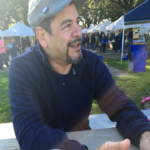 Alfred Solano was raised in Waco and is the Sales Manager for Texas Document Solutions. He and his wife Rachel are passionate about our city’s current trends and future possibilities. Alfred is the Vice President of the Business Resource Center, Waco’s downtown development corporation. He has served on the Board of Directors since its formation in 2011, representing the Cen-Tex Hispanic Chamber of Commerce.
Alfred Solano was raised in Waco and is the Sales Manager for Texas Document Solutions. He and his wife Rachel are passionate about our city’s current trends and future possibilities. Alfred is the Vice President of the Business Resource Center, Waco’s downtown development corporation. He has served on the Board of Directors since its formation in 2011, representing the Cen-Tex Hispanic Chamber of Commerce.
The Act Locally Waco blog publishes posts with a connection to these aspirations for Waco. If you are interested in writing for the Act Locally Waco Blog, please email ashleyt@actlocallywaco.org for more information.
